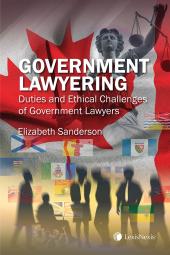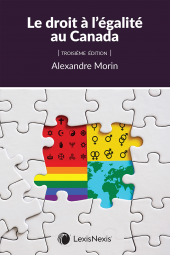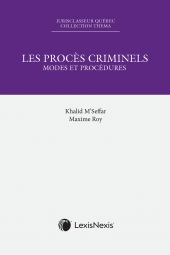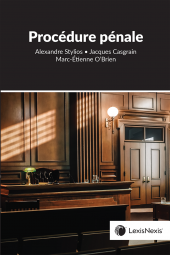Government Lawyering: Duties and Ethical Challenges of Government Lawyers
One Year Subscription Only Terms
Subscribers receive the product(s) listed on the Order Form and any Updates made available during the annual subscription period. Shipping and handling fees are not included in the annual price.
Subscribers are advised of the number of Updates that were made to the particular publication the prior year. The number of Updates may vary due to developments in the law and other publishing issues, but subscribers may use this as a rough estimate of future shipments. Subscribers may call Customer Support at 800-833-9844 for additional information.
Subscribers may cancel this subscription by: calling Customer Support at 800-833-9844; emailing customer.support@lexisnexis.com; or returning the invoice marked 'CANCEL'.
If subscribers cancel within 30 days after the product is ordered or received and return the product at their expense, then they will receive a full credit of the price for the annual subscription.
If subscribers cancel between 31 and 60 days after the invoice date and return the product at their expense, then they will receive a 5/6th credit of the price for the annual subscription. No credit will be given for cancellations more than 60 days after the invoice date. To receive any credit, subscriber must return all product(s) shipped during the year at their expense within the applicable cancellation period listed above.
Détails des produits
According to Adam Dodek, Dean of the University of Ottawa Faculty of Law (Common Law Section) and author of the foreword to this new publication, “Government Lawyering responds to a significant void in the literature about lawyers and government in Canada. [In stepping into that void, Elizabeth Sanderson] has produced a comprehensive, reflective, provocative and important book that will be of great interest to lawyers, academics, students, journalists and many informed Canadians.”
Extensive coverage and analysis
Government lawyers carry out distinct responsibilities on behalf of the historic office of the Chief Law Officer of the Crown, Ministers of Justice and Attorneys General. They carry a broader public law mandate focused on the interests of the Crown, which presents different ethical and professional responsibilities than that of a private practice lawyer acting on behalf of an individual.
Government Lawyering: Duties and Ethical Challenges of Government Lawyers is a definitive guide that delves into the ethical and legal practice issues that arise in connection with lawyering for the Crown, and in so doing, establishes the standard for government lawyering. The book begins by focusing on the range of duties imposed on government lawyers, including the typical professional and common law duties shared with lawyers in private practice, as well as the additional public law and public service duties unique to government lawyers. These additional public law duties prompt a number of ethical challenges which are explored through an examination of the principle of independence, the practical implications of being “guardian of the rule of law and public interest” and the dilemma of determining who is the client. The text also offers concrete examples of how the exercise of shared professional and public law and public service duties when representing a unique client leads to concrete distinctions in legal practice.
Useful content
This indispensable resource for new and seasoned government lawyers features:
- The practical and insightful guidance of author Elizabeth Sanderson who has more than three decades of government lawyering experience
- An analysis of the differences between public and private lawyers in the context of professional and ethical responsibilities, including the public law and public service duties
- A chapter dedicated to the key ethical challenges government lawyers face
- An explanation of the balance of public interests -- and the unique ethical duties of government lawyers – in the context of Canada, First Peoples and reconciliation
- A practical sample “Code” for government lawyering and guidance on giving the best legal advice possible
Must-have reference
Government Lawyering: Duties and Ethical Challenges of Government Lawyers will be a particularly useful acquisition for:
- Government lawyers who want to better understand their practice, role and ethical duties as government lawyers
- Law libraries and law associations that want to provide a valuable reference for their patrons
Table des matières
Part 1: Government lawyers’ layers of duties
1.1 Shared professional and common law duties
1.2 Public law duties of government lawyers
1.3 Public service duties of government lawyers
Part 2: Key ethical challenges for government lawyers
2.1 Understanding principles of independence in government lawyers
2.2 Meaning of the “guardian of the rule of law and public interest”
2.3 The old chestnut: “Who is the client?”
Part 3: Legal practice of government lawyers: Focus on similarities and differences
3.1 Duty of candour
3.2 Duty of loyalty and avoiding conflicts of interest
3.3 Taking instructions
3.4 Duty of confidentiality, privilege and the transparency debate
3.5 Making public statements and dealing with the media and the public
3.6 Legal risk management (LRM)
3.7 Withdrawal from client representation
Part 4: Canada, First Peoples and reconciliation: An illustration of balancing public interests involved in government lawyering
4.1 Reconciliation: Relationships, process or reconciled end-state?
4.2 Section 35 or beyond?
4.3 Associated concepts
4.4 Addressing Indigenous claims: Public interest choices and reconciliation challenges
4.5 Financial impact on government policy choices
4.6 Does honour of the Crown engage government lawyers?
4.7 Costs of indifference – impact of not resolving claims
4.8 Key elements of advancing broad reconciliation?
4.9 Respect
Part 5: Leadership of Deputy Minister of Justice and Deputy Attorney General
5.1 Multiple accountabilities of all deputy ministers
5.2 Public service neutrality and human resources management
5.3 Deputy ministers’ advice to ministers
5.4 Statutory mandate of the Deputy Minister of Justice and Deputy Attorney General
5.5 Practical implications
5.6 When influencing the decision-maker fails: Resign or fired
5.7 The ethics of the person in the job
Part 6: Concluding thoughts – guidance on government lawyering
6.1 Sample “Code” of government lawyering
6.2 Advice on giving the best legal advice possible
 Lexis Nexis
Lexis Nexis 


